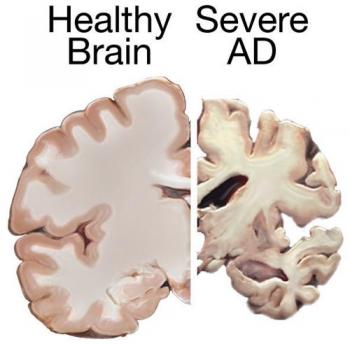We take a look at a new study that says Alzheimer’s is the third leading cause of death with one of the study’s researchers, Bryan James of Rush Alzheimer’s Disease Center. Read the full study and an article about super-agers below.
View a graphic on Alzheimer's disease.
~Graphic created by Taurean Small
 Super-agers are a group of senior citizens who make it to 85, and show no sign of cognitive issues. Dr. Neelum Aggarwal, a neurologist at the Rush Alzheimer’s Disease Center at Rush University Medical Center, describes this elite group as a growing category and has been researching what contributes to their non-cognitive lives.
Super-agers are a group of senior citizens who make it to 85, and show no sign of cognitive issues. Dr. Neelum Aggarwal, a neurologist at the Rush Alzheimer’s Disease Center at Rush University Medical Center, describes this elite group as a growing category and has been researching what contributes to their non-cognitive lives.
“These people tend to have a positive outlook on life,” said Dr. Aggarwal. “We all undergo stress, yet their emotional health is good.”
Being physically active and a social butterfly help too.
“They are really social people. They like to focus on the interaction with other people; groups and clubs, church and their families,” she said.
The lifestyle choices that Dr. Aggarwal has found present in this older age group, has allowed them to live at least another 10 years or so; and although they reach high ages, they have more reserve to ward off signs and symptoms of Alzheimer’s disease.
But not all Americans are this lucky.
The Rush Alzheimer’s Disease Center recently released a report saying that deaths related to Alzheimer’s have been underreported, and the disease is the third leading cause of death in the country. The Center for Disease Control and Prevention lists Alzheimer’s as the sixth leading cause of death in the U.S., accounting for more than 84,000 deaths in 2010.
Bryan James, lead author of the report, says that number is closer to half a million; and he says the large discrepancy comes from Alzheimer’s being underreported on death certificates.
“A lot of times there’s not a lot of information given to the person filling out the death certificate, so they may have not known that the person had been suffering from the disease,” said James.
In the report, James discusses how death certificates most often list the immediate cause of death, such as a stroke, instead of listing Alzheimer’s as an underlying case. As a neurologist, Dr. Aggarwal is able to make the connection between the disease and someone passing away.
She says that as the disease progresses and the memory loss component comes forth, individuals may forget to take their medicine, causing further health problems. There are changes in movement, which result in more incidents of falling and broken body parts. These things together can affect how someone lives, and in the long run, lead to death.
 James hopes that the report will bring awareness to how we document death, and that the way death is documented may not be accurate for how many deaths Alzheimer’s contributes to each year. Another hope is that it will bring awareness for additional funding for research and education.
James hopes that the report will bring awareness to how we document death, and that the way death is documented may not be accurate for how many deaths Alzheimer’s contributes to each year. Another hope is that it will bring awareness for additional funding for research and education.
“We are lobbying more dollars to understand the disease,” said Dr. Aggarwal. “How it started, preventative methods, and a cure. Funding would allow us to do more research.”
In President Obama’s budget for 2015, $100 million was included in an initiative to map the human brain to better understand diseases, including Alzheimer’s. But some experts say that amount may not be enough.
“I don’t think I can say an exact number but the disease is really underfunded, and we need a lot more than is currently provided,” said James.
Dr. Aggarwal agrees. She believes once the public views the disease as something that can cause death, as serious as heart disease or cancer, research may receive more funding. This would potentially allow the community to be better educated about the disease, and cause more people to live as super-agers.









